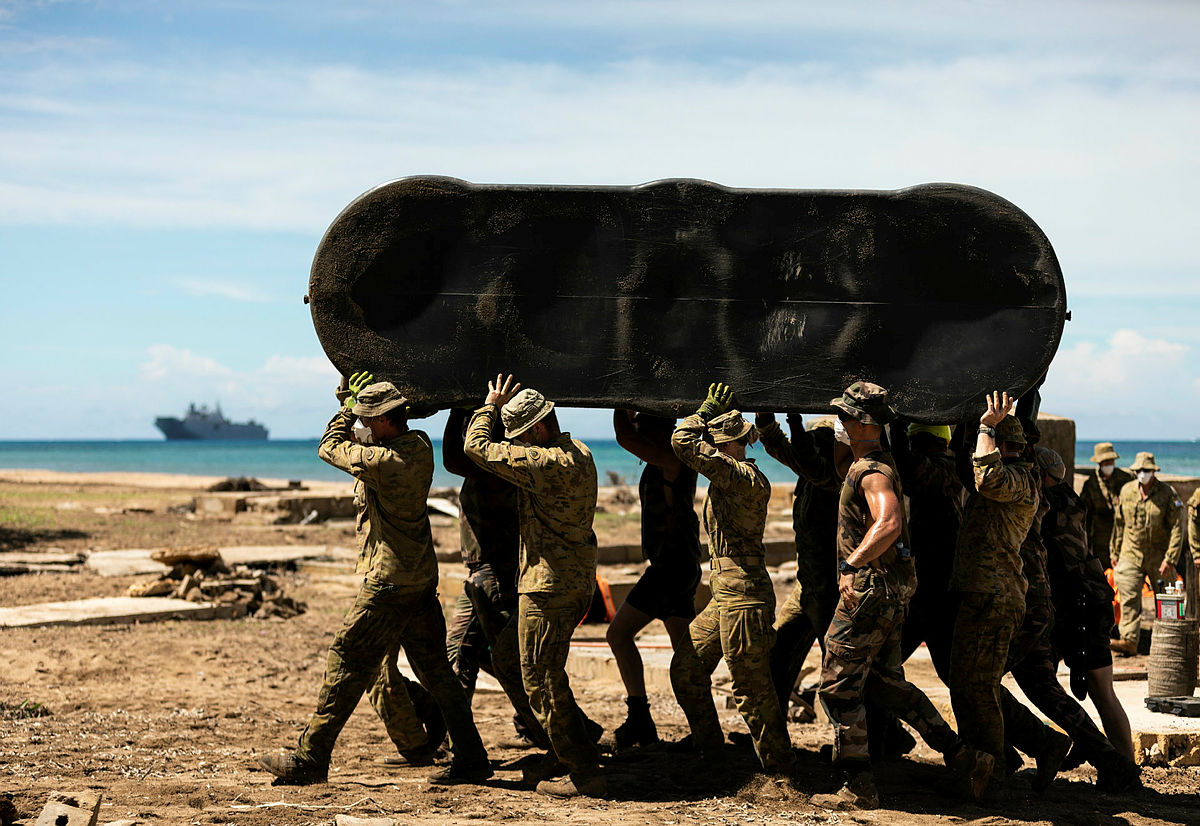
In the recent statement from the Quad leaders’ meeting in Tokyo, the Pacific islands feature prominently. Each of the Quad members of Australia, India, Japan and the US have their own unique track records and capabilities to contribute in the region.
From June through to October Japanese naval ships will make port calls to seven Pacific island countries. But perhaps Japan can be persuaded to become even more engaged, especially in the Micronesian zone, where three of the five countries (Marshall Islands, Federated States of Micronesia and Palau) have free association agreements with the US, and three (Marshall Islands, Nauru and Palau) recognise Taiwan. It’s no accident that of the five Micronesian countries, Chinese Foreign Minister Wang Yi only landed in one, Kiribati, on his tour of the region.
Japan should cooperate more in surveillance of various island exclusive economic zones. The Palau marine surveillance co-ordination centre that Japan supports could, for example, become one of the fusion centres for the flagship Quad partnership for maritime domain awareness through which risks to undersea cables as well as other maritime crimes could be evaluated.
Similarly, Australia should work more with the US in Micronesia. If the US is able to capitalise on Palau’s offer to Washington to establish a base there, then we should offer some military assets there. Australia is now building 12 offshore patrol vessels. There could be a rotational access of, say, four OPVs through the area. Being in-country, buying provisions from local shops and building people-to-people ties goes a long way. We should also be working more with the US on Guam, the centrepiece of US-led north Pacific security.
More broadly, there’s a wide range of possibilities to work with the US. Australian and US forces could deliver health assistance to the islands with regular rotation of teams of military clinicians through host-nation hospitals for around four weeks at a time, incorporating local training along the way. If requested to assist, we should encourage our engineering firms to work with the islands in land reclamation. Given the importance of maritime transport and safety in the Pacific, we should team with the US and possibly South Korea to design and construct safe ferries to be operated under the islands’ ownership. Taiwan can help with information technology and perhaps EEZ surveillance.
France is a key Pacific player with nearly 3,000 defence personnel in the region. We need to get our relationship back on track for that reason alone. These forces protect French territories and offshore zones, as well as assist in disaster response. France plays an important role in the South Pacific defence ministers’ meeting. We should enhance cooperation with France in fisheries surveillance and patrolling the high seas.
India is well placed to play a bigger role in creating options for the island states. China’s expansion is largely achieved through political warfare. That’s a battlefield on which India has proven skills: India has helped its neighbours weaken China’s grasp on their economies and elites, including in Maldives and Nepal.
In a wide range of key sectors such as education, healthcare, telecommunications, transport, renewable energy, information technology and agriculture India can provide affordable, climate- and culture-appropriate solutions. Maritime security training could be facilitated with India’s new theatre command, and through that with the Quad. Exchanges with Indian MPs and island parliaments would build understanding and contribute to pushing back on China’s attempts to shape and control international rules and norms.
Daniel Suidani, the premier of Malaita, the most populous province in Solomon Islands, recently pointed out that China wants to work with Solomon Islands on policing and ‘centralisation of control’, but that ‘policing won’t bring us development’. Rather, he argued that ‘we have a lot to gain from working more closely with India. It innovates and leads in so many sectors, including affordable healthcare, education, pharmaceuticals, IT, communications satellites and so much more, all the while being vibrant, open and diverse. We feel a natural warmth towards India.’
Australia should be willing to work with a wide range of partners in the region, depending on the needs of the island country involved, without feeling threatened. While there are many partners to work with, in many ways, Australia doesn’t have to lead, do it alone, or even be there if someone else can do it better.
The people of the Pacific want democracy, transparency, accountability and rule of law. From there, they can build their economies and become islands of stability in a free and open Indo-Pacific, benefiting all. We should be working flexibly, with like-minded countries, to use our strengths in an appropriate and co-ordinated manner to reduce each other’s weaknesses. It’s that sort of burden sharing that truly scares Beijing and gives hope to the people of the Pacific and far beyond.

